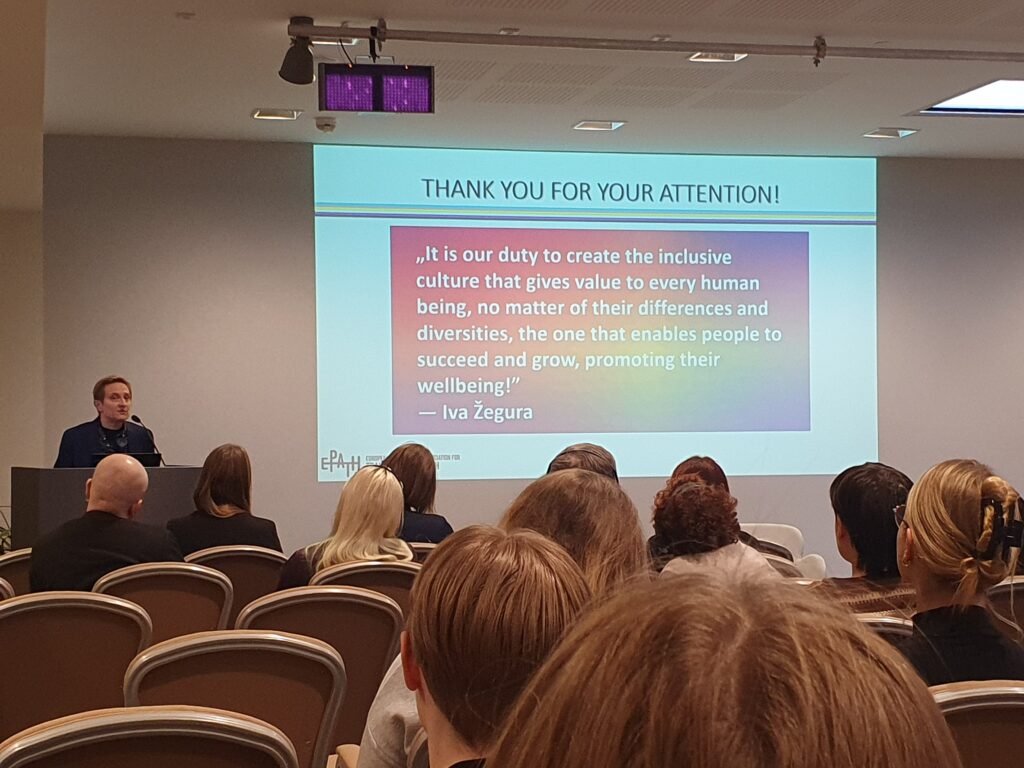Health decisions are made with trans people, not instead of them
Iva Žegura: “Healthcare workers’ white coats should symbolize healing, not a potential barrier to accessing healthcare services.” Iva Žegura is an internationally acknowledged clinical psychologist specializing in LGBTQI+ mental health, living and working in Zagreb, Croatia. In April, Žegura became the president-elect of the European Professional Association for Transgender Health (EPATH), a non-profit organization bringing together health professionals working with transgender and gender-diverse people, stepping into the position of president in 2025. Iva was in Tallinn on 27th of October, delivering the keynote address for the “LGBTQI+ Health Equality” conference, organized by Foundation Praxis and the Estonian LGBT Association. We met up the next day to talk about her work with transgender people at a time when political attacks on gender-affirming care are gaining new ground globally.
Congratulations on being elected the future president of EPATH! Is there something specific you’d like to focus on during your terms as president-elect and then as president?
Thank you! Well, there is always a lot of work. The first thing is to achieve our already established goals: produce as much evidence as possible for affirming care for trans people and implement the Standards of Care in the European healthcare systems.1 Every trans person in Europe should have access to the same quality healthcare, regardless if they’re a minor, adolescent, or adult. In the context of the anti-transgender movement, another step is to create safe spaces for both our clients and professionals who are also exposed to attacks and work under challenging conditions. Then, there’s raising awareness of different intersectionalities and intercultural issues in our constantly changing societies.
How does EPATH achieve these goals considering the diversity within Europe? For example, in Western Europe, transgender care has been accessible for a more extended period and is more standardized than, for instance, in Eastern European countries.
For example, I was elected as the representative of the Balkan and Eastern European countries. That was one way to have different countries and voices from the non-Western part of Europe represented on our board. We also include student representatives and younger researchers. That is why we created the biennial EPATH Summer School. Educating and having input from those who will soon be in our places is essential. It’s like working with clients—each generation has its issues and concerns. We should be aware of these differences. Also, we try to build a platform where we can gather—our biennial conferences. We try to reach out and make the conferences affordable for people from countries with lower incomes. It is crucial to stay connected and exchange knowledge and professional experiences. The different scientific disciplines evolve and improve constantly. In our Summer Schools, we try to have an equal number of students from different European countries. And, of course, we are still part of WPATH (World Professional Association for Transgender Health) and try to keep our connections and collaborations with other professional member associations. The same goes for NGOs. Our board also has representatives from Transgender Europe, representing trans people. You can’t create decisions and policies without hearing the voices of those with whom you work.

On October 27, 2023, Iva Žegura gave a keynote speech at the “LGBTQI+ health equality” conference in Tallinn, which was organized by the Praxis think tank and the Estonian LGBT Association.
You mentioned the anti-transgender movement and how people working in trans healthcare are under attack. Could you say more about that?
I’m very sad we have these divided positions of us versus them with an almost impossible way for some ethical, humane dialogue that respects our professional dignity, integrity, and the well-being of our trans clients. Research shows that standardized health care works and helps people. You can’t be ignorant of it. Also, you can’t deny something so obvious, something we all have: our gender identities. It should not be considered a pathology. I’m very concerned because the anti-transgender movement abuses the issue to gain political power at the cost of those who need adequate care. I don’t like using words like “unhealthy” and “healthy” because health is a continuum. But everyone should have access to healthcare and a right to live. They claim gender-affirming services have some adverse effects and potential risks, but there are risks in every medical and mental health procedure. Nobody from that movement is concerned about that. Nobody asks how many people regret simple knee operations. I mean, evidence-based medicine has several risks and evidence of posttreatment regret—and these are much higher for many other surgical interventions than, for example, gender-affirming surgery.
Nobody asks how many people regret simple knee operations.
The anti-transgender movement focuses, in particular, on healthcare for children and adolescents. Though in Croatia, we have gender recognition and trans healthcare laws based on the Standards of Care from 2015, they want to ban it or make it unavailable until the age of 25. This is their rhetoric. I am very worried about what they want to do with those minors and young adults. You can’t identify with something if your identity is not visible, forbidden by law, or doesn’t even belong to the mental health sphere. You can’t even say I have a mental health condition. I can’t go to a doctor or a therapist to get help. Even psychologists and therapists are not allowed to deal with me. But children and adolescents are very creative. They will find the help. They will self-harm to make themselves visible, or they will try suicide because they feel a burden to their parents and the world. This is what’s happening in countries without available care for transgender people or where anti-gender politics restrict or make illegal evidence-based gender recognition and standardized gender-affirming medical interventions.
It’s terrifying to see that in Russia and many US states, gender-affirming healthcare is banned.
And it’s not based on research and science. It’s pure politics and ideology. It’s a paradox. They claim gender-affirming care is an ideology, and, at the same time, they spread their ideology by banning, with no scientific evidence, access to healthcare.
As I’m listening to you, I also feel as if trans healthcare needs to be on a higher standard than other healthcare services.
Yes, because it’s very exposed. There are all kinds of misinformation and gossip about professionals who work with trans people. At least, we have it in Croatia. We are demonized in certain right-wing newspapers. This also impacts our clients. They rush to make appointments because they fear gender-affirming care will be banned and no longer provided. We are threatened. It’s not easy to work when exposed to this kind of stress. It’s also not easy to live in society as a trans person when you have to read how you are a less worthy human being or that you are considered seriously disturbed or unable to make life decisions about your identity and health simply because you have a minority identity. We should respect differences and diversities. I’m afraid we are on a long road to realizing and learning how to do that, even among professionals. We are all products of our socialization and institutions that give us diplomas without adequate competencies in working with diversities and differences.
On the one side, we have the political anti-transgender movement and negative social attitudes, but on the other side, in your experience, how does the healthcare sector treat or view professionals working with trans people?
It depends on the person. Some are very positive, but in countries where social and healthcare curriculums have no obligatory courses on human sexuality and gender, professionals don’t gain competencies in working with clients with diverse sexualities, sexual orientations, and gender identities. When I started working in 2003, one of the famous psychiatrists in our hospital approached me and asked why I was writing and talking about this issue. She advised me to stop because I would ruin my career. Then, in 2006, I published the first professional book in Croatian about LGBT identities and coming out.2 She approached me again and asked why I was persisting in working with these issues and didn’t just give up and act like a normal person, like a decent professional who deals with respectable topics.
How have things changed since then?
Things have changed because, for example, in Croatia and other European countries, we have legislation that protects LGBT+ people and other minority groups. Also, we have more education, and thanks to the European Union, we as professionals are better connected and have more funds, making it easier to plan projects, conduct research, and travel to conferences and congresses. We also have the benefit of the Internet. But the anti-transgender backlash pushes back the progress. In Croatia, the anti-transgender movement is led not just by politicians but also by medical doctors. Some are politicians and doctors, which is dangerous because they only have one value system: ideology and gaining more political power. They want to ban access to interventions for people who need them and who don’t share their identity or personal viewpoints. If you have a public healthcare system, it should be available and respective to everybody. As a professional, you should not deny healthcare based on your beliefs and ideology. You should be competent enough to address every situation. If you don’t have enough competencies or are insecure, ask your colleagues for help or refer your client to qualified specialists.
It’s a paradox. They claim gender-affirming care is an ideology, and, at the same time, they spread their ideology by banning, with no scientific evidence, access to healthcare.
What is your position on the so-called puberty blockers or hormone therapy for adolescents?
We have a lot of research, such as longitudinal studies, that point out its benefits.
How would you respond to people who say there aren’t evidence-based studies because there are no controlled trials?
There are no controlled trials in many other procedures. We still use them and don’t question their effectiveness. If it were about their child, they would move mountains to help them. It’s a paradox again. I would just ask: would they prefer to have a depressed child or a happy child? And I would say 99% would choose for their child to be happy. Left-wing parents are not the only ones having LGBT+ children. It’s not something you can learn from others. It’s not something spreading with Western cartoons, TV shows, TikTok, and music. We should look at the longitudinal follow-up studies of trans individuals. And now we have not some, but a respective number of such studies.
And what do these studies say?
The studies favor an evidence-based approach based on the Standards of Care, not gatekeeping. Organized and interdisciplinary healthcare for transgender people has existed since 1979 when German-American endocrinologist and sexologist Harry Benjamin established the Harry Benjamin International Gender Dysphoria Association, which later became the World Professional Association for Transgender Health.
The new version of Standards of Care recommends evaluating trans people who desire or need gender-affirming medical care. What is the difference between doing a cooperative assessment and gatekeeping?
I think individually tailored health care and assessment are the core concepts here. If you’re gatekeeping, in a way, you’re ignorant as a professional. The same would be true for other medical and mental health procedures. Let’s take, for example, someone who needs a pacemaker for their heart and who is also suicidal because they have a borderline personality disorder. First, you treat suicidality, stabilize the person, and educate them about the procedure. Then, you prepare the person to have the pacemaker. Of course, you will react promptly if the person’s life is in danger.
How can healthcare professionals refrain from forming gatekeeping relationships with their patients or clients?
They can educate themselves, listen to their clients, and get professional support and supervision. I know that in an oppressive society, professionals are under the microscope—as are the procedures and trans people. Everybody’s feeling afraid of everybody.
There’s a lot of distrust.
In these circumstances, we have a client who is afraid of the professional, a professional who is scared of themselves, their own decisions, their client, the system, the institution, and the state. There’s an atmosphere of distrust. And the core concepts of health are out of focus. The client’s needs and problems are out of focus, not to mention the well-being of a particular trans client. We can endlessly do, for example, psychological assessment but still miss seeing a living human in front of us. We also fail to educate and address their expectations, fears, and needs. In that case, we actually heighten risks because the client is left waiting. We can explore many things with our clients to prepare them to give informed consent and make an informed decision instead of gatekeeping. To do that, professionals should have professional autonomy, working according to their professional standards and ethics.
In many healthcare systems, including in Estonia, the first assessment for hormones and surgery needs to be done by a mental health professional, usually a psychiatrist. As a clinical psychologist, what do you think of this requirement?
I would not put one profession in front of the gate. I would advise an educated, competent, and experienced professional to do the assessment because it can be about educating the client and exploring their different identities. Maybe the person is afraid to express a more fluid identity and feels forced to have a binary gender identity. If you don’t get this kind of support or assessment, you may not have the possibility to be yourself, or you may not be satisfied with the results of the hormones or other interventions. Educating and counseling the person to participate in informed decision-making is acceptable for partially reversible interventions, like hormones, as in many other medical procedures. An educated GP can do it, for example. If the GP discovers that there is some problem, for instance, suicidality—we know the risks of applying hormonal treatment to a suicidal patient—then the GP can refer them to a mental health professional for further treatment before hormones.
What is important to do in a situation like this?
It’s essential to address the issue. The client may say that they shouldn’t be excluded from getting help because of that. But it’s vital to equip the client to deal with the problem. Then, it’s safer for them to transition. For example, some previous versions of Standards of Care required one year of living in the experienced gender identity. We know that this is very hard to do in traditional societies without some hormonal or other medical intervention. In fact, it’s dangerous for the person. This is no longer required. I support the latest Standards of Care because it provides a straightforward procedure for clients and professionals. They both know what to expect and how they can adapt—what is strongly recommended and what is advised.
It also makes the process transparent.
And decision-making easier. It gives you some secure ground to make evidence-based decisions suitable for each individual client.
Let’s also talk about ICD and the depathologization of trans identities. In ICD-11, being transgender is no longer treated as a mental disorder but as a condition related to sexual health. Also, ICD-11 replaces outdated diagnoses of “transsexualism” and “gender identity disorder of children” with “gender incongruence.” What are your thoughts on the changes introduced in ICD-11?
You usually need some health code to access healthcare. Moving the code out of mental health-related conditions is a good way to depathologize trans identities. At the same time, the new code still allows people to enter the healthcare system, and it respects different gender identities, not only binary ones. The new terminology recognizes that old ways of thinking about gender identity have contributed to the institutionalized stigmatization and pathologization of transgender people. When healthcare workers wear the white uniform, the white should symbolize healing, but it also represents potential barriers to healthcare. By barriers, I mean the decades medical and mental health professionals have pathologized different LGBT+ identities from their position of authority. It would take time to undo all the oppression within healthcare institutions. Therefore, we need constant education and available evidence-based health care for trans and gender-diverse people in all European countries and worldwide.
When healthcare workers wear the white uniform, the white should symbolize healing, but it also represents potential barriers to healthcare.
How do you think the new classification will impact the delivery of gender-affirming care?
I think when we in the European healthcare systems implement ICD-11, it will raise awareness about the new terminology, current research, new standards, and, in general, how to provide individually tailored standardized care. I expect professionals to educate themselves and be better prepared so their care would be more comprehensive and adequate toward individual needs. With the diagnosis of “transsexualism,” you know what to expect. There are only two very binary possibilities. The old terminology is also discriminatory because, in many cases, it implied forceful sterilization of trans people who needed to undergo the whole gender transition process, including surgical interventions, to have their name and gender legally recognized. The new terminology allows for an individualized approach based on the guidelines and standards, respecting the right to self-determination, autonomy, responsibility for informed decision-making, and consent for every intervention, having the client’s well-being and optimal functioning as the highest goals.
- Standards of Care refers to the international clinical guidelines produced by the World Professional Association for Transgender Health (WPATH) outlining the recommended care for transgender and gender-diverse individuals. The 8th version of the Standards of Care was published in September 2022. See www.wpath.org.
- Iva Žegura, „Coming out : Razumjeti vs. / feat. Prihvatiti“. Naklada MD, 2006. In English: „Coming Out: Understand vs./feat. Accept”.








